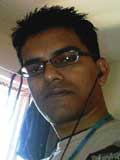How Rajdeep raised his IELTS score to Band 8
Today I am happy to share with you the email we received from Rajdeep, a young man from Pune, India who won in our ‘Best IELTS Results’ competition. Rajdeep’s first language is Bengali, and to prove his English proficiency he had to take the IELTS exam – which was a great success. Read the whole story below, in Rajdeep’s own words.

I come from the IT industry where we do weekly conferences, trainings, presentations etc with people across the globe. Therefore, somehow I initially developed a notion in my subconscious that cracking this exam would not be a big deal. But as soon as I started preparing, I realized that it is not easy. In our profession and especially in countries where English is not the native language, we do not measure or realize that even a frequent speaker might not be proficient in English.
Having said that, I believe the first step to master the language is to realize and accept your weaknesses.
And the three simple ways to identify your weaknesses are:
1. Grab a copy of “Ace the IELTS”.
2. Enroll yourself for the writing correction service.
3. Get at least one of your speaking recordings evaluated.
Trust me that if you have the above weapons, you do not need any local tuition :). IELTS–Blog Team and their services are the best.
Listening – I seldom had issues in this module. However, the key to scoring well is to stay calm and focused (as if you are a part of that conversation) and of course follow the tips mentioned in the “Ace the IELTS” book, so that you do not fall into the traps. If you lose the answer to a question, accept it immediately and continue listening carefully for the next answers. For those who find this module difficult, get acquainted with the different foreign accents. Try to get all answers correct in the first two sections because the next two are the difficult ones.
Reading – In this module, time is against us. Hence, efficient time management is a must. Scan through the passages and underline the key words. However, mere scanning does not always help. You need to understand the gist of each paragraph to get the correct answers, especially for those who require 7. The strategy that helped me, was to read a paragraph and immediately scan all the questions and extract those, the answer to which were hidden in that paragraph, and then move on to reading the next one. Remember, it is easier to scan the questions multiple times than repeatedly scanning the lengthy paragraphs :).
Writing – This module is challenging as we generally lose the habit of writing after our school days. The best way to improve writing is to read the sample essays in the blog, learn the types of essays and letters and their body structures from “Ace the IELTS”. Once you start practicing, get those evaluated with the help of the correction service. Expert’s evaluation is mandatory in this module. Besides, to score band 7, vocabulary is a must. One aspect which gives a feel in your essay and keeps the reader interested is to construct short and precise sentences while expressing the ideas. This can be developed by reading daily newspapers, magazines etc. Remember, “Brevity is the soul of wit”. Lastly, practice, practice, practice and stop not till the goal is reached. I remember writing 29 essays while practicing (whew!).
Speaking – This is the fun part, enjoy while practicing. Do not speak too fast but speak at a pace you are comfortable with. Remember, your speech gets recorded and hence it is crucial to get your sentences grammatically correct – an aspect which we often overlook while speaking. Usage of advanced vocabulary is needed to achieve 7. Record your voice and listen by using recording gadgets, software etc. In addition, get at least one of the recordings evaluated with the help of the speaking evaluation service.
Finally, force yourself to the examination conditions i.e. practice the listening, reading and writing modules without a break and when you’re ready, just go and crack it.”


